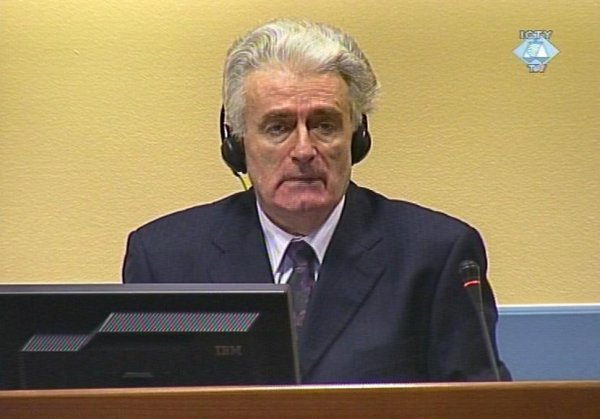Home
KARADZIC’S MOTION ON ‘HOLBROOKE AGREEMENT’ DISMISSED
The purported immunity agreement, the Appeals Chamber has concluded, would not bind the Tribunal in any way even if it were proven that Holbrooke did act on behalf of the Security Council or the OTP in The Hague. In order to be binding, the agreement would either have to be ratified by a Security Council resolution or by the consent of the judges or a Trial Chamber. Without that, the prosecution cannot withdraw the already confirmed indictment
 Radovan Karadzic in the courtroom
Radovan Karadzic in the courtroom The Appeals Chamber dismissed the motion Radovan Karadzic submitted against the decision of the Trial Chamber that dismissed Karadzic’s motion challenging the Tribunal’s jurisdiction because of a purported immunity agreement Karadzic had concluded with Richard Holbrooke. The Appeals Chamber thus removed one of the final obstacles standing in the way of the trial of the former Republika Srpska president. There are only two pending matters left: Karadzic's appeal against the trial date and his motion to disqualify Judge Baird because of his ‘advanced age’. Karadzic is charged with genocide and other crimes in BH.
Leaving aside the question whether the ‘Holbrooke agreement’ existed or not, the Appeals Chamber carefully considered three legal issues. First, whether the Tribunal's jurisdiction can be limited exclusively by a UN Security Council resolution; second, whether the Tribunal would be bound if the purported agreement were concluded on behalf of the prosecution; and third, if the agreement would prevent the Tribunal from executing its jurisdiction under the ‘abuse of process’ doctrine.
As regards the first issue, the Appeals Chamber started from the fact that the UN Security Council passed a resolution accepting the Statute of the Tribunal, defining the scope and limits of Tribunal’s jurisdiction. This jurisdiction can be changed only by the Security Council resolutions. However, the Appeals Chamber notes that "there is no resolution excluding the Appellant from the ambit the Tribunal’s jurisdiction’.
Even if the accused were right when he said that Holbrooke acted on behalf of the Security Council, this would not limit the Tribunal’s jurisdiction unless the purported agreement were ratified by a UN resolution.
The Appeals Chamber reached a similar conclusion in relation to the second issue: the Tribunal would not be bound by the agreement, even if it could be attributed to the prosecution. Two indictments had already been issued against Karadzic when the agreement was purportedly signed and the prosecution could not have withdrawn them without the consent of the judges or of the entire Trial Chamber.
The Trial Chamber’s decision states that Karadzic failed to show that there had been any abuse jeopardizing his right to a fair trial, adding that ‘any alleged promises of a third party not related to the Tribunal’ do not fall under the abuse of process doctrine. The Appeals Chamber has gone one step beyond, ruling that even if all Karadzic’s claims were true, his ‘expectations that he would not stand trial’ do not represent the kind of abuse that would require the case against him to be dropped. Noting that putting an end to impunity and punishing the gravest war crimes were among the fundamental goals of the Tribunal, the Appeals Chamber decided that ‘individuals accused of such crimes can have no legitimate expectations of immunity from prosecution’.
Linked Reports
- Case : Karadzic
- 2009-10-06 TRIAL START UNCERTAIN, INDICTMENT UNCHANGED
- 2009-10-02 HOW KARADZIC SEES HIS TRIAL
- 2009-10-01 KARADZIC ACCUSES PROSECUTION OF ‘POLITICAL COWARDICE’
- 2009-10-15 KARADZIC TO GO ON TRIAL ON 26 OCTOBER
- 2009-10-19 PROSECUTION FILES OPERATIVE INDICTMENT AGAINST KARADZIC
- 2009-10-21 KARADZIC’S MOTION TO RECUSE JUDGE BAIRD REJECTED
